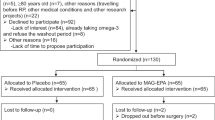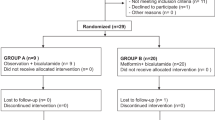Abstract
Background:
Men with biochemical recurrence (BCR) of prostate cancer are typically observed or treated with androgen-deprivation therapy. Non-hormonal, non-toxic treatments to slow the rise of PSA are desirable. We studied a combination herbal supplement, Prostate Health Cocktail (PHC), in prostate cancer cell lines and in a population of men with BCR.
Methods:
PC3, LAPC3 and LNCaP cells were incubated with increasing concentrations of PHC suspension. Men previously treated for prostate cancer with surgery, radiation or both with rising PSA but no radiographic metastases were treated with three capsules of PHC daily; the primary end point was 50% PSA decline. Circulating tumor cells (CTCs) were identified using parylene membrane filters.
Results:
PHC showed a strong dose-dependent anti-proliferative effect in androgen-sensitive and independent cell lines in vitro and suppression of androgen receptor expression. Forty eligible patients were enrolled in the clinical trial. Median baseline PSA was 2.8 ng ml−1 (1.1–84.1) and 15 men (38%) had a PSA decline on study (1–55% reduction); 25 (62%) had rising PSA on study. The median duration of PSA stability was 6.4 months. Two patients had grade 2/3 transaminitis; the only other grade 2 toxicities were hyperglycemia, hypercalcemia and flatulence. There were no significant changes in testosterone or dihydrotestosterone. CTCs were identified in 19 men (47%).
Conclusions:
Although the primary end point was not met, PHC was well tolerated and was associated with PSA declines and stabilization in a significant number of patients. We believe this is the first report of detecting CTCs in men with BCR prostate cancer. Randomized studies are needed to better define the effect of PHC in men with BCR.
This is a preview of subscription content, access via your institution
Access options
Subscribe to this journal
Receive 4 print issues and online access
$259.00 per year
only $64.75 per issue
Buy this article
- Purchase on Springer Link
- Instant access to full article PDF
Prices may be subject to local taxes which are calculated during checkout



Similar content being viewed by others
References
Keating NL, O’Malley J, Smith MR . Diabetes and cardiovascular disease during androgen deprivation therapy for prostate cancer. J Clin Oncol 2008; 24: 4448–4456.
Ross RW, Small EJ . Osteoporosis in men treated with androgen deprivation therapy for prostate cancer. J Urol 2002; 167: 1952.
Crook JM, O’Callaghan CJ, Duncan G, Dearnaley DP, Higano CS, Horwitz EM et al. Intermittent androgen suppression for rising PSA level after radiotherapy. N Engl J Med 2012; 367: 895–903.
Dale W, Hemmerich J, Bylow K, Mohile S, Mullaney M, Stadler WM . Patient anxiety about prostate cancer independently predicts early initiation of androgen deprivation therapy for biochemical cancer recurrence in older men: a prospective cohort study. J Clin Oncol 2009; 27: 1557–1563.
Fowler FJ Jr, Collins MM, Corkery EW, Elliott DB, Barry MJ . The impact of androgen deprivation on quality of life after radical prostatectomy for prostate carcinoma. Cancer 2002; 95: 287–295.
Pantuck AJ, Leppert JT, Zomorodian N, Aronson W, Hong J, Barnard RJ et al. Phase II study of pomegranate juice for men with rising prostate-specific antigen after surgery or radiation for prostate cancer. Clin Cancer Res 2006; 12: 4018.
Cheung E, Pinski J, Dorff T, Groshen S, Quinn DI, Reynolds CP et al. Oral fenretinide in biochemically recurrent prostate cancer: a California Cancer Consortium phase II trial. Clin Genitourin Cancer 2009; 7: 43–50.
Skowronski RJ, Peehl DM, Feldman D . Vitamin D and prostate cancer: 1,25 dihydroxyvitamin D receptors and actions in human prostate cancer cell lines. Endocrinology 1993; 132: 1952–1960.
Moffatt KA, Johannes WU, Hedlund TE, Miller GJ . Growth inhibitory effects of 1a,25-dihydroxyvitamin D3 are mediated by increased levels of p21 in the prostatic carcinoma cell line ALVA-31. Cancer Res 2001; 61: 7122–7129.
Bauer JA, Thompson TA, Church DR, Ariazi EA, Wilding G . Growth inhibition and differentiation in human prostate carcinoma cells induced by the vitamin D analog 1a,24-dihydroxyvitamin D2. Prostate 2003; 55: 159–167.
Beer TM, Lemmon D, Lowe BA, Henner WD . High-dose weekly oral calcitriol in patients with a rising PSA after prostatectomy or radiation for prostate carcinoma. Cancer 2003; 97: 1217–1224.
Heinonen OP, Albanes D, Virtamo J, Taylor PR, Huttunen JK, Hartman AM et al. Prostate cancer and supplementation with a-tocopherol and b-carotene: incidence and mortality in a controlled trial. J Natl Cancer Inst 1998; 90: 440–446.
Zhang Y, Ni J, Messing EM, Chang E, Yang C-R, Yeh S . Vitamin E succinate inhibits the function of androgen receptor and the expression of prostate-specific antigen in prostate cancer cells. Proc Natl Acad Sci USA 2002; 99: 7408–7413.
Siler U, Barella L, Spitzer V, Schnorr J, Lein M, Goralczyk R, Wertz K . Lycopene and vitamin E interfere with autocrine/paracrine loops in the Dunning prostate cancer model. FASEB J 2004; 18: 1019–1021.
Clark LC, Combs G, Turnbull BW, Slate EH, Chalker DK, Chow J et al. Effects of selenium supplementation for cancer prevention in patients with carcinoma of the skin. A randomized controlled trial. Nutritional Prevention of Cancer Study Group. JAMA 1996; 276: 1957–1963.
Lippman SM, Klein EA, Goodman PJ, Lucia MS, Thompson IM, Ford LG et al. Effect of selenium and vitamin E on risk of prostate cancer and other cancers: the selenium and vitamin E cancer prevention trial (SELECT). JAMA 2009; 301: 39–51.
Zhao R, Domann FE, Zhong W . Apoptosis induced by selenomethionine and methioninase is superoxide mediated and p53 dependent in human prostate cancer cells. Mol Cancer Ther 2006; 5: 3275–3284.
Zu K, Ip C . Synergy between selenium and vitamin E in apoptosis induction is associated with activation of distinctive initiator caspases in human prostate cancer cells. Cancer Res 2003; 63: 6988.
McLarty J, Bigleow RLH, Smith M, Elmajian D, Ankem M, Cardelli JA et al. Tea polyphenols decrease serum levels of prostate-specific antigen, hepatocyte growth factor, and vascular endothelial growth factor in prostate cancer patients and inhibit production of hepatocyte growth factor and vascular endothelial growth factor in vitro. Cancer Prev Res 2009; 2: 673–682.
Tang F-Y, Nguyen N, Meydani M . Green tea catechins inhibit VEGF-induced angiogenesis in vitro through suppression of VE-cadherin phosphorylation and inactivation of Akt molecule. Int J Cancer 2003; 106: 871–878.
Goldman WH, Sharma AL, Currier SJ, Johnston PD, Rana A, Sharma CP . Saw palmetto berry extract inhibits growth and cox-2 expression in prostatic cancer cells. Cell Biol Int 2001; 25: 1117–1124.
Rannikko A, Petas A, Raivio T, Janne OA, Rannikko S, Adlercreutz H . Plasma and prostate phytoestrogen concentrations in prostate cancer patients after oral phytoestrogen supplementation. Prostate 2006; 66: 82–87.
Handayani R, Rice L, Cui Y, Medrano TA, Samedi V, Baker H et al. Soy isoflavones alter expression of genes associated with cancer progression, including interleukin-8, in androgen-independent PC-3 human prostate cancer vells. J Nutr 2006; 136: 75–82.
Fang MZ, Chen D, Sun Y, Jin Z, Christman JK, Yang CS . Reversal of hypermethylation and reactivation of p16INK4a, RARbeta, and MGMT genes by genistein and other isoflavones from soy. Clin Cancer Res 2005; 11: 7033–7041.
Shen JC, Klein RD, Wei Q, Guan Y, Contois JH, Wang TT et al. Low-dose genistein induces cyclin-dependent kinase inhibitors and G(1) cell cycle arrest in human prostate cancer cells. Mol Carcinog 2000; 29: 92–102.
Guo Y, Wang S, Hoot DR, Clinton SK . Suppression of VEGF-mediated autocrine and paracrine interactions between prostate cancer cells and vascular endothelial cells by soy isoflavones. J Nutr Biochem 2007; 18: 408–417.
Yin Y, Ni J, Chen M, Guo Y, Yeh S . RRR-alpha-vitamin E succinate potentiates the antitumor effect of calcitriol in prostate cancer without overt side effects. Clin Cancer Res 2009; 15: 190–200.
Amir H, Karas M, Giat J, Danilenko M, Levy R, Yermiahu T et al. Lycopene and 1,25-dihydroxyvitamin D3 cooperate in the inhibition of cell cycle progression an dinduction of differentiation in HL-60 leukemic cells. Nutr Cancer 1999; 33: 105–112.
Scher HI, Eisenberger M, D’Amico AV, Halabi S, Small EJ, Morris M et al. Eligibility and outcomes reporting guidelines for clinical trials for patients in the state of a rising prostate-specific antigen: recommendations from the prostate-specific antigen working group. J Clin Oncol 2004; 22: 537–556.
Simon R . Optimal two-stage designs for phase II clinical trials. Controlled Clin Trials 1989; 10: 1–10.
Scher HI, Halabi S, Tannock I, Morris M, Sternberg C, Carducci MA et al. Design and endpoints of clinical trials for patients with progressive prostate cancer and castrate levels of testosterone: recommendations of the prostate cancer clinical trials working group. J Clin Oncol 2008; 26: 1148–1159.
Freedland SJ, Humphreys EB, Mangold LA, Eisenberger M, Dorey FJ, Walsh PC et al. Risk of prostate cancer specific mortality following biochemical recurrence after radical prostatectomy. JAMA 2005; 294: 433–439.
Valicenti RK, DeSilvio M, Hanks GE, Porter A, Brereton H, Rosenthal SA et al. Posttreatment prostate specific antigen doubling time as a surrogate endpoint for prostate cancer specific survival: an analysis of Radiation Therapy Oncology Group Protocol 92-02. Int J Radiat Oncol Biol Phys 2006; 66: 1064–1071.
http://www.nccn.org/professionals/physician_gls/pdf/prostate.pdf. Accessed 13 June 2014.
White J . PC-SPES: a lesson for future dietary supplement research. J Natl Cancer Inst 2002; 94: 1261–1262.
Gaziano JM, Glynn RJ, Christen WG, Kurth T, Belanger C, MacFadyen J et al. Vitamins E and C in the prevention of prostate and total cancer in men. JAMA 2009; 301: 52–62.
Tuohimaa P, Tenkanen L, Ahonen M, Lumme S, Jellum E, Hallmans G et al. Both high and low levels of blood vitamin D are associated with a higher prostate cancer risk: a longitudinal, nested case-control study in the Nordic countries. Int J Cancer 2004; 108: 104–108.
Paller CJ, Ye W, Wozniak PJ, Gillespie BK, Sieber PR, Greengold RH et al. A randomized phase II study of pomegranate extract for men with rising PSA following initial therapy for localized prostate cancer. Prostate Cancer Prostat Dis 2013; 16: 50–55.
Chee KG, Longmate J, Quinn DI, Chatta G, Pinski J, Twardowski P et al. The AKT inhibitor perifosine in biochemically recurrent prostate cancer: a phase II California/Pittsburgh cancer consortium trial. Clin Genitourin Cancer 2007; 5: 433–437.
Antonarakis ES, Zahurak ML, Lin J, Keizman D, Carducci MA, Eisenberger MA . Changes in PSA kinetics predict metastasis-free survival in men with PSA-recurrent prostate cancer treated with nonhormonal agents. Cancer 2012; 118: 1533–1542.
de Bono JS, Scher HI, Montgomery RB, Parker C, Miller MC, Tissing H et al. Circulating tumor cells predict survival benefit from treatment in metastatic, castration-resistant prostate cancer. Clin Cancer Res 2008; 14: 6302–6309.
Aragon-Ching JB, Simmens SJ, Andrawis R, Hendricks F, Frazier H et al. Circulating tumor cells in biochemical recurrence of prostate cancer: final results. J Clin Oncol 2013; (suppl 6): abstr 179.
Lin HK, Zheng S, Williams AJ, Balic M, Groshen S, Scher HI et al. Portable filter-based microdevice for detection and characterization of circulating tumor cells. Clin Cancer Res 2010; 16: 5011–5018.
Zheng S, Lin H, Liu JQ, Balic M, Datar R, Cote RJ et al. Membrane microfilter device for selective capture, electrolysis and genomic analysis of human circulating tumor cells. J Chromatogr A 2007; 1162: 154–161.
Acknowledgements
This study was supported by the Whittier Foundation, with additional support from the Cancer Center Core Grant Grant P30 CA014089.
Author information
Authors and Affiliations
Corresponding author
Ethics declarations
Competing interests
Dr Pinski holds the patent for Prostate Health Cocktail and has commercial interest in the company that distributes it, OncoNatural Solutions. The other authors declare no conflict of interest.
Rights and permissions
About this article
Cite this article
Dorff, T., Groshen, S., Tsao-Wei, D. et al. A Phase II trial of a combination herbal supplement for men with biochemically recurrent prostate cancer. Prostate Cancer Prostatic Dis 17, 359–365 (2014). https://doi.org/10.1038/pcan.2014.37
Received:
Revised:
Accepted:
Published:
Issue Date:
DOI: https://doi.org/10.1038/pcan.2014.37
This article is cited by
-
Evaluation of anti-tumorigenic activity of BP3B against colon cancer with patient-derived tumor xenograft model
BMC Complementary and Alternative Medicine (2016)
-
An evaluation of the anti-angiogenic effect of the Korean medicinal formula “Sa-mi-yeon-geon-tang” in vitro and in ovo
BMC Complementary and Alternative Medicine (2015)



